- [Alumni Interview] Artificial Intelligence is Changing the World By Connecting Us with Our Future May 10, 2024
-
Solving world problems with AI Joo-Kyung Jung, leader of the AI Lab at the Remember BigData Center (Computer Science 10)
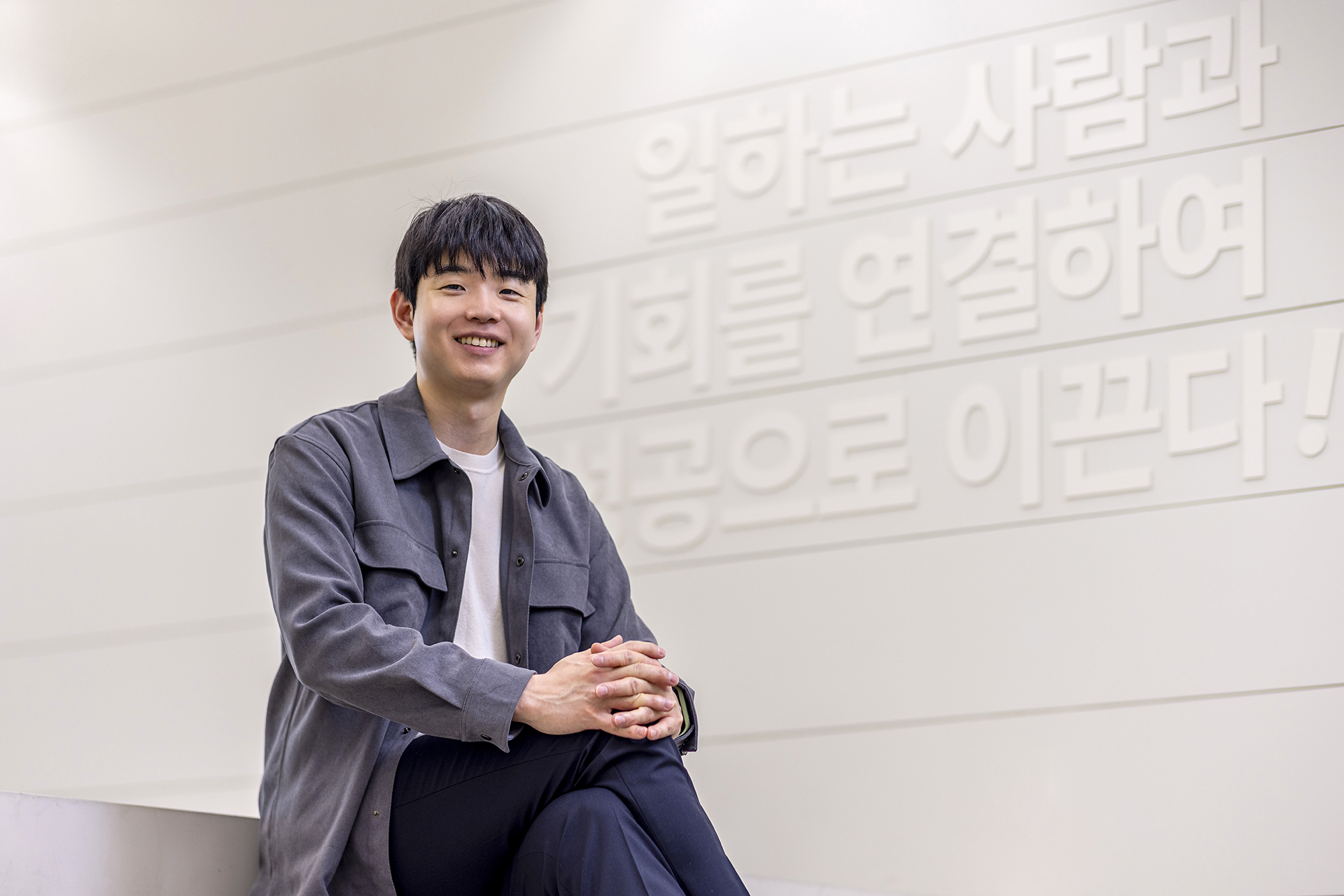
If we were to name the most prominent technology at present, it would undoubtedly be artificial intelligence (AI) technology. Many people expect that the remarkable potential of AI technology will bring about a better tomorrow, as we are directly experiencing and perceiving the world being transformed by AI solutions. From a long time ago, Joo-Kyung Jung, one of our alumnus, had the strong conviction that AI technology would contribute to shape a new world. Furthermore, he is fully committed to immerse himself in every moment, striving to resolve today's challenges and move toward a brighter future. Working intensely and joyfully, he claims to be an AI nerd.
The irresistible joy of programming
Joo-Kyung Jung did not have a strong conviction or specific goal when he chose his major. However, his unexpected encounter with computers during his childhood was an intriguing and lasting experience.
"I was lost during middle school. I was tired and bored of the routine of studying at the academy every night after school until 11 p.m. while preparing for the science high school. I told my parents that I was no longer capable and deviated a bit. Looking back now, I don't know why I thought about it, but I suddenly wanted to learn computer programming languages. The academy was mainly intended for preparing future office workers, and I was the only junior high school student in the class (laughter). Programming became my fate and influenced my decision to choose computer science. Rather than having a specific direction, it was more of a positive feeling.”
After staring university, he thoroughly enjoyed his college life for 1 year. As a result, his grades were terrible. In the second semester of the second year, Jung started studying late and became deeply absorbed in the joy of programming while taking major courses.
“Rather than being interesting in itself, it seemed like computers were more of a fascination for the ‘otaku.’ I had such a feeling, but while taking the required course on ‘Data Structures and Algorithms,’ I felt a strong interest. The course focused on structurally representing data and designing algorithms to enable computers to handle data efficiently. It was widely regarded as one of the most challenging subjects, requiring intense mental effort and mathematical reasoning. I actually think that aspect suited me well.”
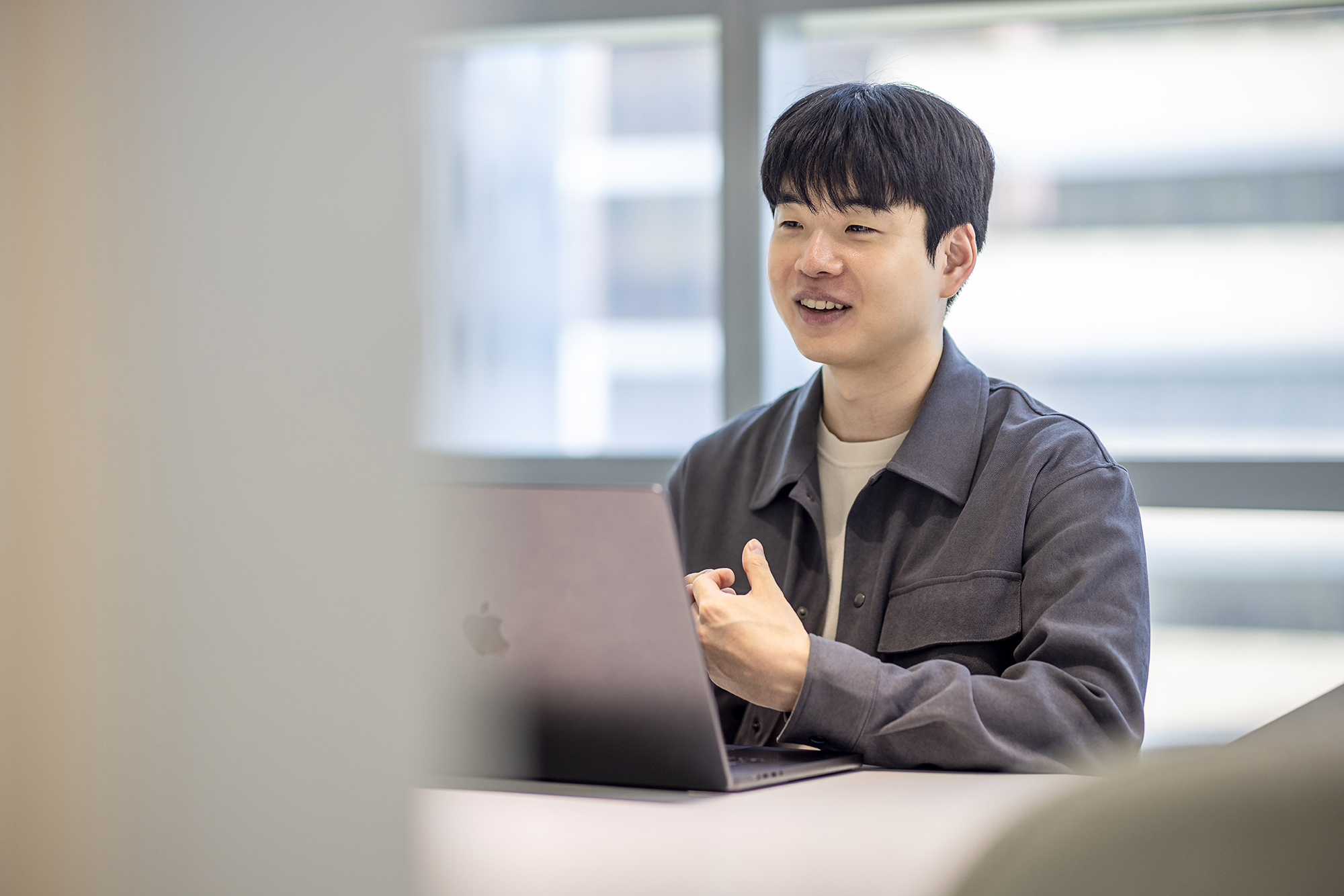
His interest in programming accelerated after he heard about the “College Student Programming Contest.” The competition was challenging, requiring participants to solve 10 programming problems within 5 hours, and an online preliminary round eliminated over half of the participants. He became more deeply engrossed in the enjoyment of solving problems, rather than in the difficulty of implementing complex algorithms flawlessly. He spent entire days studying programming, except for mealtime. He advanced to the finals multiple times. He was so determined to win the competition that he even took a leave of absence from school to achieve his goal.
“The very act of engaging in tasks that require significant mental effort was enjoyable. The fact that I was deeply engaged in solving a problem using my intellect, rather than focusing on what the problem itself was, was extremely satisfying. Despite the strain and damage to muscles that occurs after intense exercising, there is still a refreshing feeling and a tremendous sense of accomplishment that comes rushing in. The experience was similar. After immersing myself and using my brain, I may feel exhausted, but the sense of accomplishment I feel at that moment is indescribable."
Destined encounter with AI and immersion
The passion for programming of Joo-Kyung Jung naturally led him to start a career in the field.
“I joined the global IT company Qualcomm by recommendation of a senior member of the programming club and now work as a software engineer in a team that investigates computer vision, which is a major area in AI. That's when I learned about AI technology. During my undergraduate years, I didn't even know about the existence of that field. At that time, although deep learning technology existed, it was not popular. I was very excited about AI technology. I was convinced that AI would change the future and wanted to conduct research on it.”
Hence, Jung stepped into the realm of AI. However, at that time, AI could only be learned during master's or doctoral studies. Thirsty for knowledge about the subject, he immersed himself in the lectures of Andrew Ng, a professor at Stanford University and one of the top three experts in AI. He listened to his lectures online and became so immersed in the subject that he didn't even sleep, completing a curriculum that typically took 3-4 weeks in just 5 days. He absorbed the content easily, even when watching the lectures at 2-3 times the normal playback speed. He recalls the feeling of knowledge being absorbed into his mind. The experience that he was deeply immersed in with great passion became the catalyst for establishing a routine of solving at least five programming problems and researching related papers every day, even amidst a busy schedule.
“For several years now, I have been consistently spending 1 hour a day after work to solve programming problems. Amidst rapid technological changes, it is important to grasp technology trends and not to lose one’s intuition. Moreover, it is a passion that I enjoy, which is why I consistently engage in it. Imagine how life would change for avid athletes if they stopped exercising for a day. Thus, they make an effort to do it every day. I feel the same way. Furthermore, these experiences have deepened the firm commitment to further advance my career in AI.”
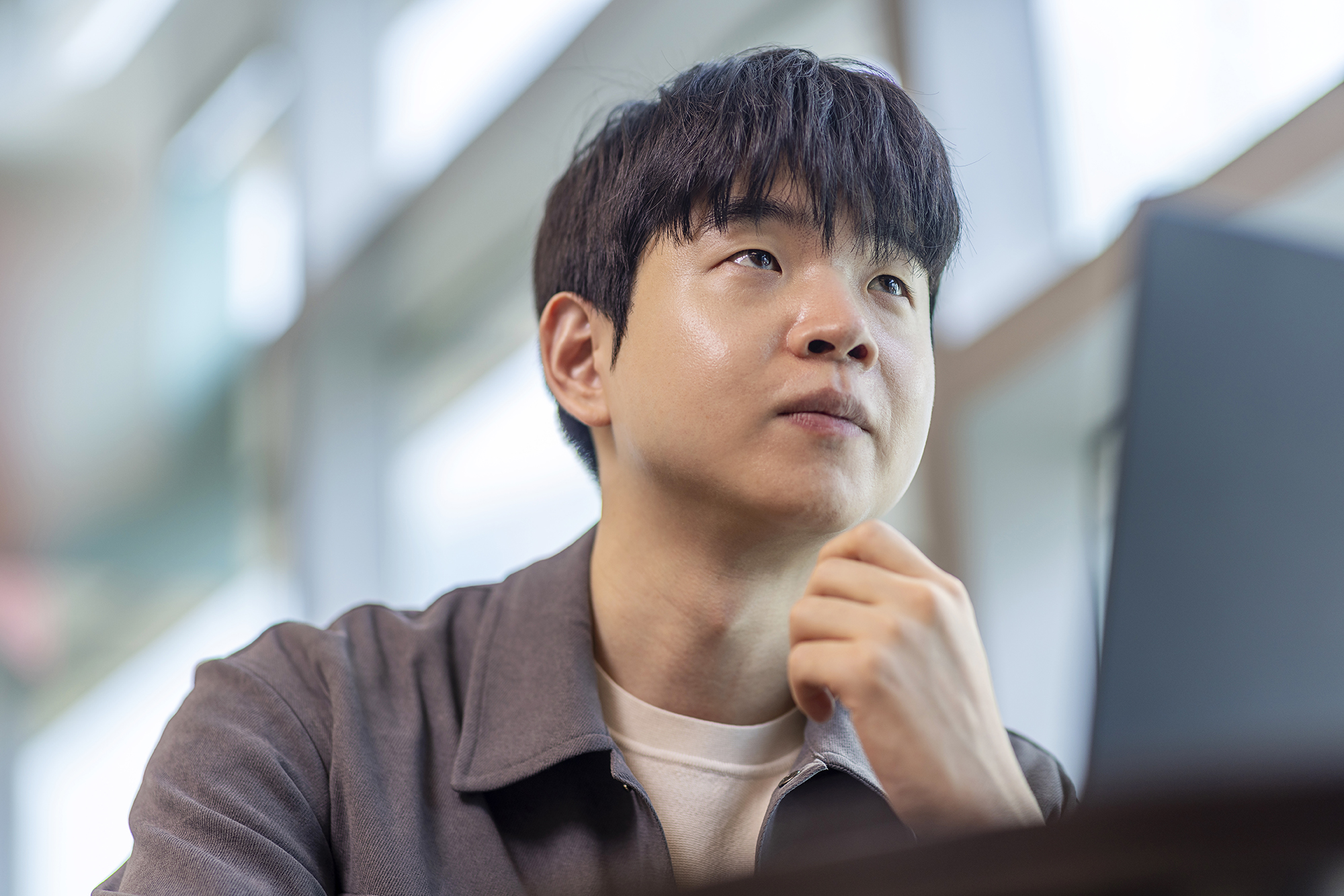
The direct resolution of current problems and pursuit of challenging and enjoyable work
Joo-Kyung Jung moved from the popular company Qualcomm to a startup called Remember, which is highly appreciated by potential workers. Although most people would find this decision perplexing, he is both passionate and adventurous. He found today's challenging tasks more intriguing than technology for the distant future. While preparing for the job change, he came across a job posting for a career research position at Qualcomm, where he had connections with Remember. It was a promising position that could be applied for not only by doctoral and master's degree holders, but also by bachelor graduates.
“During my time at Qualcomm, Remember's CEO visited us to request verification on whether optical character recognition technology for recognizing text in documents could automatically input business card information. I was responsible for a significant portion of that testing. Above all, Remember aims at opening a new chapter in business card management. I have led the development of a service that allowed for the online storage and utilization of business cards and advanced the service to enable automatic input of information through camera recognition, thereby revolutionizing business card management. Today, it's common to receive a business card and naturally enter it and save it online. Furthermore, being a startup, it seemed like there would be plenty of exciting and challenging tasks to undertake. Qualcomm is a forward-thinking company, and many of the technologies it invests in and researches heavily on are not commercialized. At Remember, we conduct research on AI technologies that can be currently applied in practice. I'm excited about solving current problems. Here, I am constantly challenged. If I fail, I must revisit the problem. Thanks to such active challenges, Remember is once again leading the way in recruitment solutions. We have become a company that stands out uniquely by applying AI technology to career recruitment.”
The job interview assignment was the first step towards solving the current problem. It was related to the automatic input of business cards, and throughout the preparation, he felt excited and gained confidence while contemplating application methods after reading papers. It was implemented through a project at the company after he joined. Although there were some trials and errors along the way, even working overtime was enjoyable. According to Jung, no one has examined more business cards than him. The project was commercialized after 2 months of effort, bringing a great sense of accomplishment.
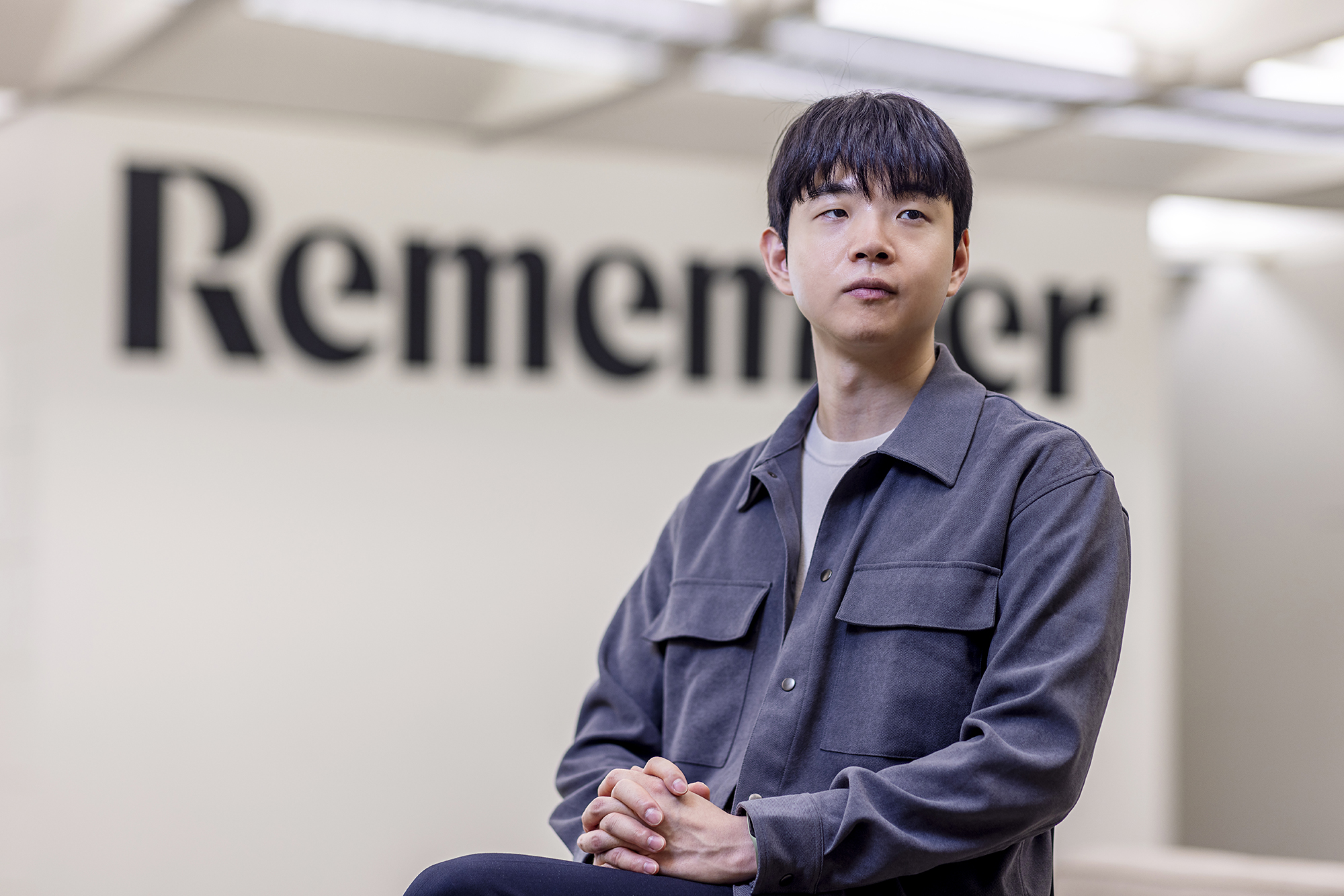
Leading the development of the service “Recruitment Secretary” that has transformed the job market for hiring in career positions
For over 7 years, Joo-Kyung Jung has accumulated expertise by incorporating AI technology into various services at Remember, placing him undeniably at the core of the company's AI technology development. He has been actively leading the Remember AI Lab since last year, where data and AI technology are used to solve problems arising from business card and recruitment services for launching new related services.
“Initially, they intended to hire an AI lab leader with extensive expertise and experience. Recruitment was open for a long time, and they couldn't find the right person. So, I applied for the company, volunteering to lead the AI Lab. I wanted to learn about multiple topics and level up my skills. I also wanted to contribute more to the company through AI technology. I was told that the president hoped I would volunteer (laughs). At first, I had never tried to take on a leadership role in an organization, but I overcame that challenge by reading several books on leadership per week. I found the process very interesting. There were noticeable points to be mindful of and areas for improvement as well as many collaborators within the company who needed to learn more. Now, the team is progressing steadily and achieving important results. This has boosted our confidence.”
The first major project that he led was the “AI Recruitment Secretary” solution. This solution is highly regarded as an innovative service that has significantly transformed the users’ recruitment process and job market dynamics. Previously, career positions were generally filled through personal connections or headhunters, but now companies can directly approach and extend scouting offers to a myriad of experienced professionals. The most challenging aspect of the process was the recruitment officer personally searching for suitable candidates and engaging in discussions to inquire about their intentions and persuade them. The development by Jung is intended to solve this problem through the Recruitment Secretary service.
“By using the Recruitment Secretary service, recruiters now only need to provide the job description as text. The service then applies AI technology to find suitable candidates with the appropriate skills and experience for a given position. We have unrivaled size and quality in a talent pool of over 4 million experienced professionals. We believe that we can solve hiring problems by performing the right search. This service even writes messages that are sent to candidates. All you need is a well-organized job description and our Remember AI recruitment solution. We facilitate the process of finding and persuading talents efficiently and expediently.”
The accuracy and speed in finding job candidates exceed expectations. By accurately understanding the context of the job description, the AI implementation can find 200 fitting candidates in just 10 minutes, whereas the manual process requires around 2 hours to find 20 candidates. Hence, efficiency shows at least a 100-fold increase. This service recently achieved the top position in the category of career recruitment platforms in the 2024 South Korea First Brand Awards.
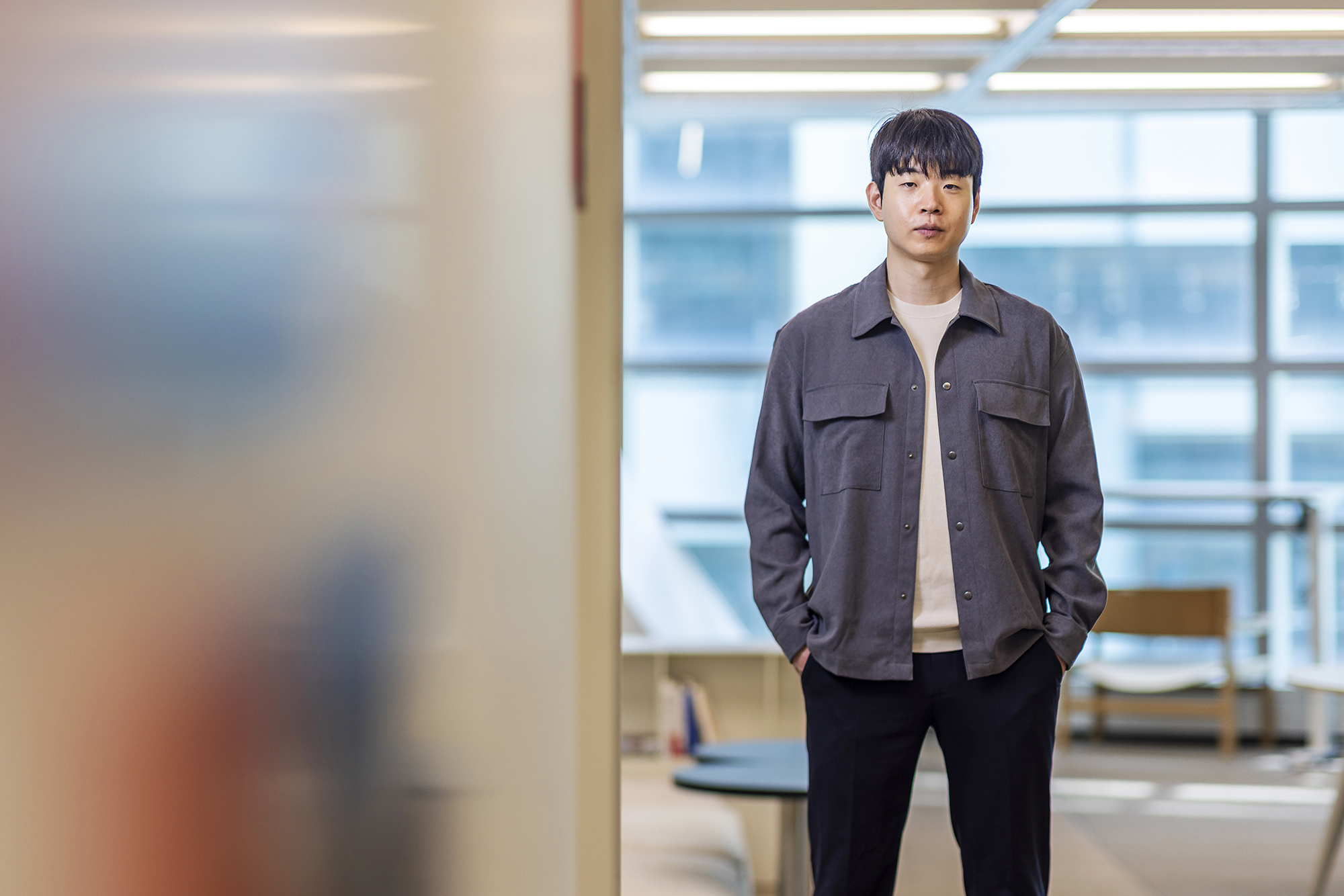
If you give your best effort today, opportunities will reach you.
Joo-Kyung Jung is intrigued and passionate about the transformative possibilities offered by AI. He is continuously expanding his skills and horizons to deeper and broader levels. Jung arrives at work before any other employee, acquires knowledge for personal growth, and fearlessly tackles challenging tasks day by day. Despite the fatigue, he considers this process of gradual accumulation meaningful.
“My motto is to live each day diligently. One of the reasons we solve programming challenges, read papers, and read books to train our brains every day is because every day is precious. Currently, I am training both the brain used for language skills and the brain used for programming while studying English and programming. During my battle with COVID-19, I managed to solve programming problems even when I was on the verge of collapsing. I also underwent surgery for a nasal issue, but even then, I continued to solve problems from my hospital bed. I have always been like that. I always give my utmost effort and as a result, I have seized good opportunities without letting them slip away.”
Even industry professionals often wonder if the advancement of AI will lead to the disappearance of many jobs, including those of developers. Expectations and apprehensions coexist regarding the global transformations brought by AI. Still, Jung asserts unequivocally that he is not afraid.
“Ultimately, individuals who have worked diligently and excelled in one field tend to perform equally well in other fields. Even if a profession is replaced by AI, various problems in the world will remain to be solved. The means to solve problems is through development, AI, and other strategies, but the process of solving problems holds a greater value. So, I'm not afraid. As long as there are problems in the world, opportunities are always open, and I believe that I can do well.”
What are the new opportunities that Joo-Kyung Jung is looking forward to today?
“The job market remains in its phase of growth, and many values will be created and generated. There are still many individuals who have not experienced such value through Remember. I want to give those people the technology to experience a significant change. As a researcher in AI technology, I strive to convey its potential to people whenever appropriate.”
“I want for AI technology to be used for more noble purposes. I want to have a positive impact on the world. I want to help people grow and lead the development of the world by connecting working individuals with opportunities and realizing the company's path toward success.”
The Yonsei Network is a significant asset for us.
Although there is still a long way to go, Joo-Kyung Jung, a fellow alumnus, has a strong desire to help the growth of his juniors as opportunities arise from his achievements. He recommends that juniors make the most of the knowledge and expertise accumulated by seniors with exceptional abilities and seek their assistance.
“I have had many good seniors and made good connections throughout my life. Looking back, what was fascinating was that there was a senior from the university who was working at Qualcomm, and there was always someone who had a lot of overtime and weekend work. Despite being busy, they always made time to teach me a lot. It was really fascinating. To the senior fellow, I might be just another person he temporarily interacted with. However, now that I have taken on the position of a senior, I find myself wanting to bestow kindness. Now, I understand exactly what was going through their minds. Seniors are not unapproachable. On the contrary, I am delighted when juniors visit me, and I am willing to treat them even better. It would be beneficial if you can effectively learn from your seniors. Particularly, as Yonsei seniors are highly competent, there is much to learn from them. This was the main reason for me to quickly establish in society and grow.”
AI technology was unimaginable just 10 years ago, but it is now leading innovation in all fields. Just as Joo-Kyung Jung, a fellow alumnus who has grown by fully immersing himself in the present to open up his future, AI technology will rapidly transform our present and make us more hopeful for the future. What will the future look like? Jung will undoubtedly embrace the role of the nerd, the protagonist who finds joy in finding and solving the big and small problems in our lives with technology, bridging the present and future to create more value in the world.
show mobile menu
mobile menu




![[Alumni Interview] Artificial Intelligence is Changing the World By Connecting Us with Our Future](/_attach/image/en_sc/2024/05/f297d948707c187a3af7201c90c139c9.png)